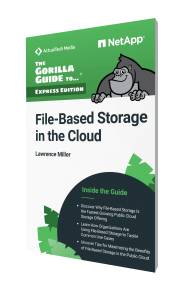New Release: The Gorilla Guide To…® File-Based Storage in the Cloud, Express Edition!

A modern web-based or mobile-based app is not too hard to move into the cloud. These apps already communicate with databases and other components through standardized APIs that the cloud usually supports. But many older applications are file-based. They may use non-standard data formats or even flat files such as logs. Few cloud providers make it easy to migrate them over.
The most popular type of mass storage in the cloud is object-based, such as AWS’s S3 service. Object storage is very efficient, which is good both for response time and for lowering storage costs. But it’s something of a black box, requiring a specialized API.
Let’s look at the concepts behind file versus object storage. As the terminology of “files” and “folders” suggests, file-based storage is like a well-organized file cabinet. In contrast, object-based storage is like W.C. Fields’s desk in Man on the Flying Trapeze. In that classic 1935 movie, Fields could instantly extract any piece of paper his company needed from his desk, but nobody else had a hope of finding anything.
Moving to the cloud also raises new issues of supporting new operating systems, performance, and other challenges.
File-Based Storage in the Cloud describes services offered by NetApp geared toward file-based storage, the fastest-growing type in the cloud (see Figure 1). NetApp is friendly to legacy applications, bestowing the typical benefits that the cloud offers for security, access for geographically remote users, metrics, and monitoring. As data sets grow, the needs of knowledge workers grow more sophisticated, and the pace of technological change picks up generally, this guide is a good one to check out for the future of your organization.

Inside the Guide
Gorilla Guides make learning and discovery approachable and easy, and they take the guesswork out of navigating complicated IT technologies. Written by an industry expert, [and brought to you by [US Signal, this resource is packed full of trusted information about how the Edge is impacting the IT landscape, and how you can move forward by making the jump to the Edge!
Download the book and learn all about:
- Advantages and Challenges of Moving Legacy Applications to the Cloud
- How NetApp Provides Scalability, Performance, Risiliance, and System Interoperability
- NetApp Case Studies
Table of Contents
Introduction
Chapter 1: Moving File-Based Applications to the Cloud
- File-Based IaaS Is the Fastest-Growing Storage Service in the Public Cloud
- File Services Challenges in the Cloud
Chapter 2: Exploring Use Cases
- Business Applications
- DevOps Solutions
- File Services
- Disaster Recovery
Chapter 3: Getting Started
- Optimize
- Integrate
- Connect
- Adapt
- Protect
- Get More Out of the Cloud with NetApp
Download Your Copy!
About the Author
Lawrence Miller, CISSP, has worked in information security and technology management for more than 25 years. He has previously worked as the Vice President of IT for a major Verizon reseller, director of IT and e-commerce for a retail merchandising company, and IT operations manager for a top 100 U.S. law firm. He is the author of more than 200 books on various topics including information security, cloud, unified communications and collaboration, storage, 5G, and the Internet of Things.
About NetApp
In a world full of generalists, NetApp is a specialist. We’re focused on one thing, helping your business get the most out of your data. NetApp brings the enterprise-grade data services you rely on into the cloud, and the simple flexibility of cloud into the datacenter. Our industry-leading solutions work across diverse customer environments and the world’s biggest public clouds.
As a cloud-led, data-centric software company, only NetApp can help build your unique data fabric, simplify and connect your cloud, and securely deliver the right data, services, and applications to the right people—anytime, anywhere.
Download the book here.